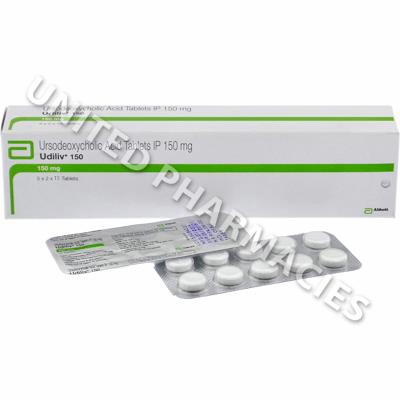Customers also like
Description
| Main Use | Active Ingredient | Marketed Name |
| Treating gallstones | Ursodesoxycholic Acid | Udiliv |
Uses
Udiliv (Ursodesoxycholic Acid) has a wide range of applications. Among the main areas are cholesterol stones in the gall bladder, hepatitis (chronic, including atypical forms of chronic autoimmune, acute viral), non-alcoholic steatohepatitis, toxic (including alcoholic, medicinal) liver lesions, primary biliary cirrhosis and cystic fibrosis liver, primary sclerosing cholangitis, atresia of intrahepatic biliary tract, cholestasis in parenteral nutrition, dyskinesia of the biliary tract, biliary reflux gastritis and reflux esophagitis; chronic opisthorchiasis; prevention of liver damage when using hormonal contraceptives and cytostatics.
Udiliv (Ursodesoxycholic Acid) has an immunomodulatory, hypocholesterolemic, hepatoprotective, choleretic, cholelitolitic effect. It stabilizes the membranes of hepatocytes and cholangiocytes, has a direct cytoprotective effect. As a result of the action of drug on the gastrointestinal circulation of bile acids, the content of hydrophobic (potentially toxic) acids decreases. By reducing the absorption of cholesterol in the intestines and other biochemical effects has a cholesterol-lowering effect. Udiliv (Ursodesoxycholic Acid) suppresses cell death caused by toxic bile acids.
Possessing high polar properties, ursodesoxycholic acid (UDCA) forms non-toxic mixed micelles with apolar (toxic) bile acids, which reduces the ability of gastric reflux to damage cell membranes in biliary reflux gastritis and reflux esophagitis.
Dosage and Administration
Always follow your doctor`s instructions when using Udiliv (Ursodesoxycholic Acid) to get the safest and most effective results from treatment. The total daily dose depends on the main pathology, the concomitant diseases, the patient`s weight, the results of laboratory tests and ultrasound examination, and other factors. As a rule, it ranges from 300 mg per day.
Side effects
The use of Udiliv (Ursodesoxycholic Acid) may cause side effects in some patients including:
- Diarrhea or constipation;
- Nausea;
- Pain in the epigastric region and right hypochondrium;
- Calcination of gallstones;
- Increased activity of hepatic transaminases;
- Allergic reactions (rash and itching).
Precautions
Aluminum-containing antacids bind ursodesoxycholic acid in the intestine, reduce its absorption and weaken its effectiveness..
Lipid-lowering drugs (especially clofibrate), estrogens, neomycin, progestins can increase the saturation of bile with cholesterol and reduce the ability of UDCA to dissolve cholesterol biliary calculi.
Using during pregnancy and lactation
In pregnancy, it is possible if the expected effect of treatment outweighs the potential risk to the fetus (adequate and strictly controlled studies of the safety of use in pregnant women have not been performed). Care is required when prescribing to lactating women (it is not known whether the drug penetrates into breast milk).






